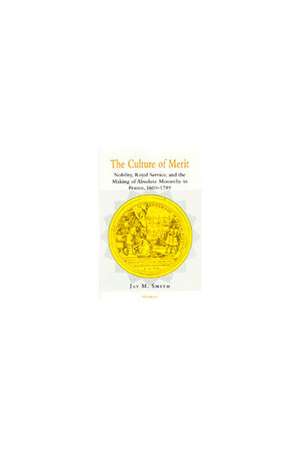The Culture of Merit: Nobility, Royal Service, and the Making of Absolute Monarchy in France, 1600-1789: Studies In Medieval And Early Modern Civilization
Autor Jay M Smithen Limba Engleză Hardback – 25 sep 1996
The eighteenth century's critique of privilege and its commitment to the idea of advancement by merit are widely regarded as sources of modernity. But if meritocratic values were indeed the product of the Enlightenment and the French Revolution, how do we explain earlier attention to merit--especially the nobility whose values the Revolution rejected? The Culture of Merit probes this paradox by analyzing changing perceptions of merit among the old nobility from the age of Louis XIII to the eve of the French Revolution.
Jay M. Smith argues that the early modern nobility instinctively drew a correlation between the meaning of merit and an image of the "sovereign's gaze." In the early seventeenth century, merit meant the qualities traditionally associated with aristocratic values: generosity, fidelity, and honor. Nobles sought to display those qualities before the appreciative gaze of the king himself. But the expansion of the monarchy forced the routinization of the sovereign's gaze, and Louis XIV began to affirm and reward new qualities--talent and application--besides those thought innately noble.
The contradictions implicit within the absolute monarchy's culture of merit are demonstrated by the eighteenth-century French army, which was dominated by the nobility, but also committed to efficiency and expertise. Smith shows that the army's continuous efforts to encourage and reward "merit" led to a clash of principles. The ever-growing emphasis on talent and discipline led reformers--the great majority of them noble--to attack the most egregious examples of privilege and favoritism in the army. Smith's analysis of the long-term evolution in conceptions of royal service suggests a new explanation for the shift in values signified by the French Revolution. The transition away from the "personal" gaze of the king toward the "public" gaze of the monarchy and nation foretold the triumph of a new culture of merit in which noble birth would have no meaning.
The Culture of Merit will interest historians and other social scientists concerned with issues of aristocratic identity, state formation, professionalization, and the changing political culture of pre-Revolutionary France.
Jay M. Smith is Assistant Professor of History, University of North Carolina, Chapel Hill.
Jay M. Smith argues that the early modern nobility instinctively drew a correlation between the meaning of merit and an image of the "sovereign's gaze." In the early seventeenth century, merit meant the qualities traditionally associated with aristocratic values: generosity, fidelity, and honor. Nobles sought to display those qualities before the appreciative gaze of the king himself. But the expansion of the monarchy forced the routinization of the sovereign's gaze, and Louis XIV began to affirm and reward new qualities--talent and application--besides those thought innately noble.
The contradictions implicit within the absolute monarchy's culture of merit are demonstrated by the eighteenth-century French army, which was dominated by the nobility, but also committed to efficiency and expertise. Smith shows that the army's continuous efforts to encourage and reward "merit" led to a clash of principles. The ever-growing emphasis on talent and discipline led reformers--the great majority of them noble--to attack the most egregious examples of privilege and favoritism in the army. Smith's analysis of the long-term evolution in conceptions of royal service suggests a new explanation for the shift in values signified by the French Revolution. The transition away from the "personal" gaze of the king toward the "public" gaze of the monarchy and nation foretold the triumph of a new culture of merit in which noble birth would have no meaning.
The Culture of Merit will interest historians and other social scientists concerned with issues of aristocratic identity, state formation, professionalization, and the changing political culture of pre-Revolutionary France.
Jay M. Smith is Assistant Professor of History, University of North Carolina, Chapel Hill.
Preț: 538.89 lei
Preț vechi: 665.30 lei
-19% Nou
Puncte Express: 808
Preț estimativ în valută:
103.13€ • 107.27$ • 85.14£
103.13€ • 107.27$ • 85.14£
Carte indisponibilă temporar
Doresc să fiu notificat când acest titlu va fi disponibil:
Se trimite...
Preluare comenzi: 021 569.72.76
Specificații
ISBN-13: 9780472096381
ISBN-10: 0472096389
Pagini: 320
Dimensiuni: 152 x 229 x 30 mm
Greutate: 0.68 kg
Ediția:New.
Editura: UNIVERSITY OF MICHIGAN PRESS
Colecția University of Michigan Press
Seria Studies In Medieval And Early Modern Civilization
ISBN-10: 0472096389
Pagini: 320
Dimensiuni: 152 x 229 x 30 mm
Greutate: 0.68 kg
Ediția:New.
Editura: UNIVERSITY OF MICHIGAN PRESS
Colecția University of Michigan Press
Seria Studies In Medieval And Early Modern Civilization
Descriere
A study of the paradoxical position of French nobility just before the French Revolution





